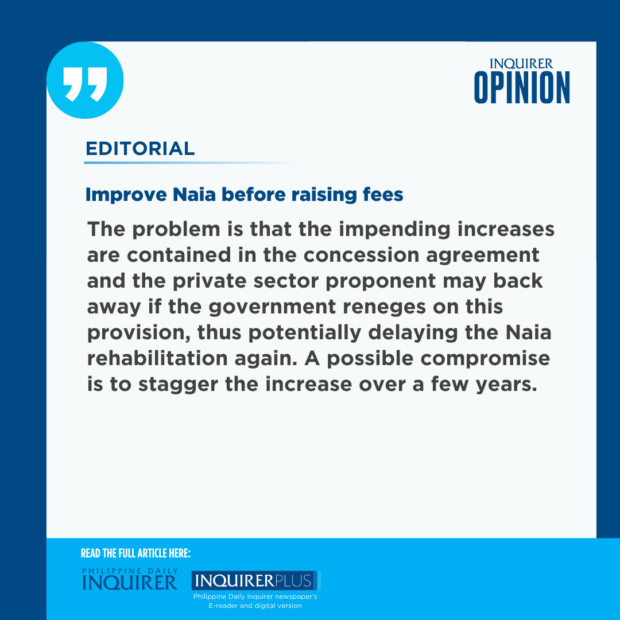Improve Naia before raising fees

Since Transportation Secretary Jaime Bautista announced last month that fees at the aging Ninoy Aquino International Airport (Naia) would start increasing this year, several groups have come forward to express their opposition.
The impending adjustment in terminal and passenger fees followed the awarding last February of the much-delayed P170.6-billion rehabilitation and expansion project for what has been dubbed as one of the worst airports in the world.
Operation of the country’s premier gateway is scheduled to be turned over next month to the New Naia Infrastructure Corp., led by San Miguel Corp. (SMC), which is tasked to nearly double the passenger capacity to more than 60 million a year, and dramatically improve passenger experience.
The Department of Transportation (DOTr) said the planned rate hike is “within the approved parameters, terms, and conditions specified in the tender documents for the Naia rehabilitation project.” Passenger service charges or terminal fees are imposed on departing passengers, while landing and takeoff fees are for the use of airport facilities and services during aircraft landings and takeoffs.
Both fees are added to the total ticket cost paid by passengers. Domestic travelers at present pay a terminal fee of P200, while foreign travelers shell out P550.
Mounting complaints
These are to increase sharply to P390 and P950, respectively. Bautista noted that the increase in terminal fees will be implemented in 2025, but those for the other airport charges could take effect before the end of the year.
“There will be an increase because the concessionaire needs to be compensated for their investments. The charges they will collect are expected to improve the airport’s efficiency,” Bautista says to justify the impending hikes.
But while it is true that private proponents of infrastructure projects are allowed by the government to recover their investments, the mounting complaints against the impending hikes in Naia fees have a very valid point: Why front-load the increase?
Previous undertakings allowed private firms to recover their investments through fee hikes after the investments have actually been made, but the government now appears to be allowing the Naia consortium to start the recovery process even before improvements are made to the airport.
Take the case of the North Luzon Expressway (NLEx), which was privatized by the government in the 1990s. First Philippine Holdings of the Lopez family formed the Manila North Tollway Corp. (MNTC) in 1998 after it won the government contract to rehabilitate, expand, and operate NLEx. The rehabilitated NLEx started operations in February 2005 and toll rates were increased in the same year, not when it was awarded in 1998.
Acceptable reason
As part of the asset divestment program of the Lopez group, MNTC was sold to Metro Pacific Investment Corp. of tycoon Manuel Pangilinan in 2008. In May 2017, MNTC sought — and was granted in November of that year — an increase in NLEx toll fees. Again, the rate hike was allowed after the improvements were done.
In the case of Naia, the government is allowing the SMC-led consortium to recover the P30-billion upfront payment it made to the government during the signing of the Naia rehabilitation contract at Malacañang Palace last March 18.
“We demand an explanation. We need an acceptable reason for these pending increases on charges and other fees considering that there are no improvements that have been shown yet. It is unreasonable to ask the riding public to shoulder costs before they even receive any benefits,” Consumers Union of the Philippines president Rodel Taton told the Inquirer.
Bantay Konsyumer, Kalsada, at Kuryente (BK3) secretary general Patrick Climaco also emphasized that airport fees are expected to naturally increase, but the promised rehabilitation must be completed first.
Possible compromise
The problem is that the impending increases are contained in the concession agreement and the private sector proponent may back away if the government reneges on this provision, thus potentially delaying the Naia rehabilitation again.
A possible compromise is to stagger the increase over a few years, similar to the case of the South Luzon Expressway (SLEx) rehabilitation by the San Miguel group. In consideration of the welfare of the expressway’s users and to minimize the effects of the toll rate changes, the Toll Regulatory Board instructed the SLEx operator to implement the rate adjustments in two phases, the first in November 2023 and the second in 2024.
A last recourse for consumers is Congress, which DOTr’s Bautista says has to approve the proposed increases in Naia fees. Lawmakers should consider the welfare of consumers, given today’s inflationary problems, and not just the desire of the Naia consortium to recover their investments quickly.
As BK3’s Climaco pointed out, these consumers are faced with another severe blow because the airport fee increases will be implemented without them feeling the benefit and comfort of its promise first.
















